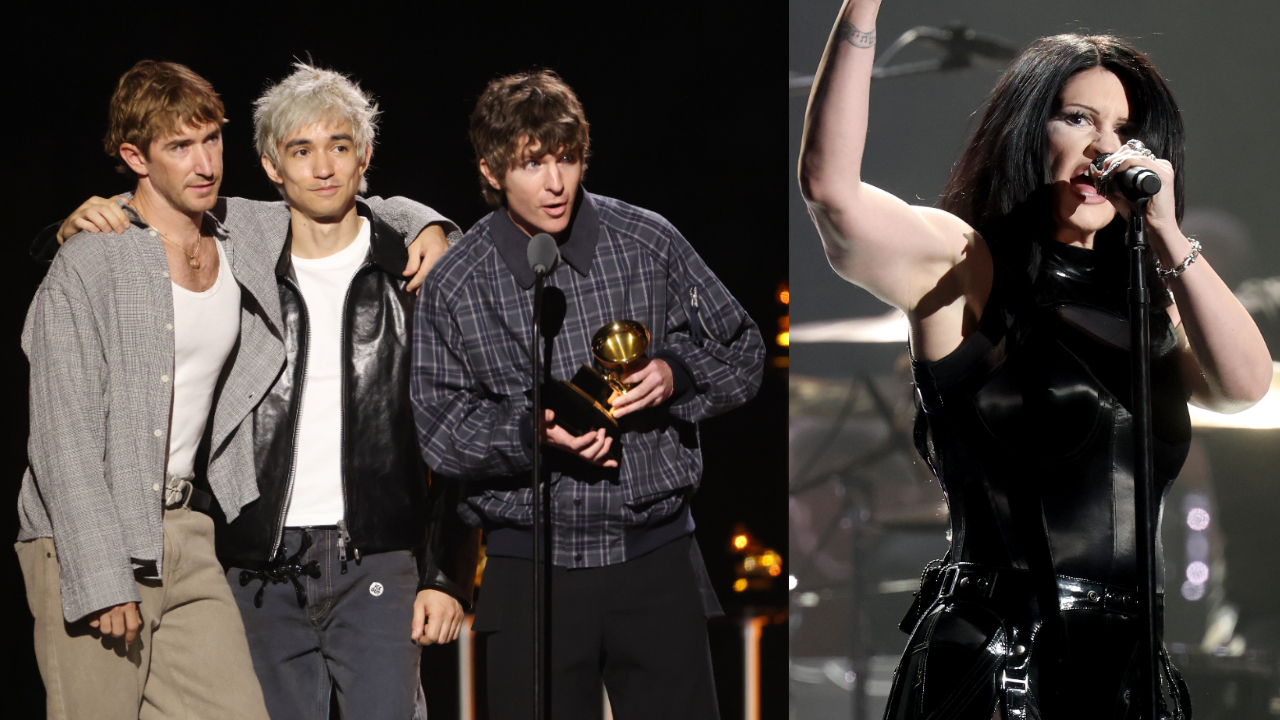"He smells like the inside of your grandmother's purse": Spinal Tap's improbable return is the comeback no one expected – and even fewer requested
Three men, one vision, several lawsuits
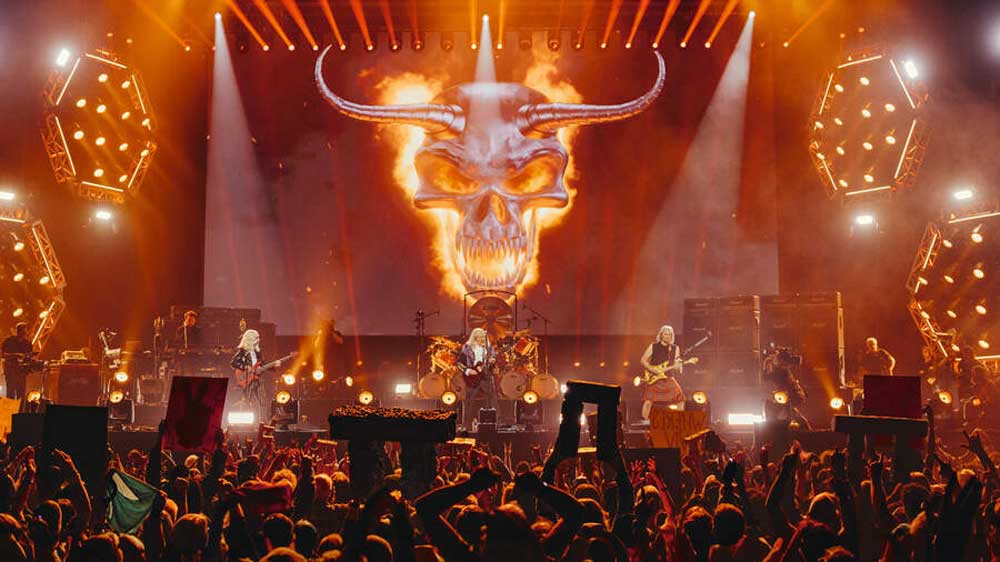
Of all the comebacks of the 21st century, the return of Spinal Tap is simultaneously the most consequential and inconsequential of them all. Led Zeppelin’s one-off show at London’s O2 in 2007 might have been the most talked about, and Black Sabbath’s recent reunion/farewell the most poignant, but nothing will provoke as much joy, celebration and mockery as the return of Tap.
A brand new documentary, Spinal Tap II: The End Continues, sees the band reuniting with director Marty DiBergi, the man behind celebrated 1984 documentary This Is Spinal Tap, which captured the disastrous US tour in support of their infamous Smell The Glove album.
The band weren’t inactive in the years that followed the original film. They attempted a comeback with 1992’s ill-fated Break Like The Wind album, and subsequently played a handful of gigs, including a memorable appearance at 2007’s Live Earth concert, where they were joined by what was (inaccurately) billed as “every known bass player in the universe”. But after yet another attempted relaunch with 2009’s Back From The Dead album fell apart in apparent acrimony, it seemed like Tap were finally done.
Except you can’t keep a good band down, and the same applies to Spinal Tap. When Hope Faith, daughter of the band’s late, cricket bat-wielding manager Ian Faith, discovered that Tap were contractually obliged to play one final gig, wheels were set in motion. It ultimately led to singer/ guitarist David St Hubbins, guitarist Nigel Tufnel and bassist Derek Smalls getting back together for a huge comeback show in New Orleans.
“It’s one thing to reunite your band on stage for a good time, it’s another thing to reunite your band in a court of law,” St Hubbins says today of the lawsuit-dodging impetus behind the show.
And so the three of them are back at the rock’n’roll coal face once more, pick-axes and shovels in hand. They talk to Classic Rock individually via Zoom with the cameras off, although whether that’s for privacy or vanity isn’t clear.
“I look in the mirror and I see an old man,” says Tufnel. “I don’t feel like an old man inside, but there’s an old man in that mirror. Sometimes he’s so old he’s not even looking at me. That’s how fucking old he is.”
Sign up below to get the latest from Classic Rock, plus exclusive special offers, direct to your inbox!
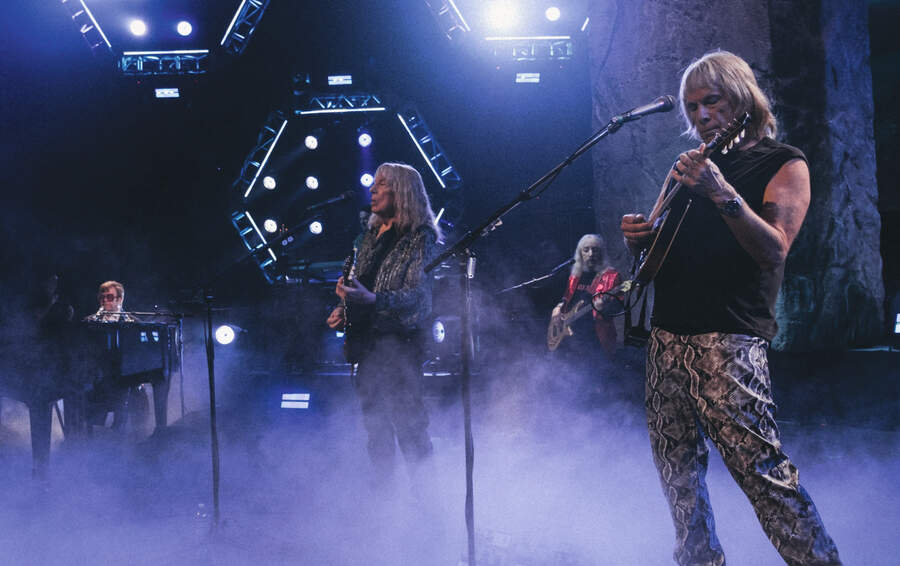
David St Hubbins is in a chipper mood. But then he would be, given that he’s currently relaxing in Morro Bay, the coastal town in California where he’s lived for several years. “I’m a bit of a superstar here,” he says. “Which is to say that I’m the only remotely recognisable person who lives here.”
St Hubbins didn’t quit music after Tap fell apart. In the film, when DiBergi tracks him down he’s playing with a local Mariachi band in Morro Bay. “Well, that’s just a weekend thing,” he says. “Instead of learning Spanish, I just decided to play Spanish.”
Unlike some musicians of his vintage, St Hubbins has managed to eke out a living from his chosen trade, although he did have to diversify. In recent years he’s done everything to making music for podcasts to writing the soundtrack for a yet-to-be-released horror movie set in an old-age home (“It’s called Night Of The Assisted Living Dead”). Most successfully, he’s carved out a semi-lucrative career himself composing hold music. “It’s the music you hear when you’re put on hold,” he explains. “It’s a great way of expressing yourself without thinking.” He even won an award for the latter. “A Holdy,” he says proudly.
Still, he admits there were reservations about the new movie.
“Oh, nothing but reservations,” he says. “We didn’t care for the way we came across in the first film. It seemed like Marty DiBergi focused on all the worst aspects of being a hard-working rock band on tour in the United States. I’m not saying every show was amazing. Some of them were more like a flaming bag of dog crap on your doorstep that you have to stamp out as soon as possible then take your shoes to be cleaned. But we didn’t like the way he presented us as this bumbling tribe of mad men. Which I’m not denying we were.”
Part of the problem was St Hubbins’ relationship with Tufnel – or lack of it. He hadn’t spoken to his childhood friend in 15 years, ever since the band fell apart following the Back From The Dead album “My issues with Nigel go back to when we were in single digits. There were a couple of things that happened that I couldn’t get past. Nigel’s different. He forgets things. He has the uncluttered mind of a tot.”
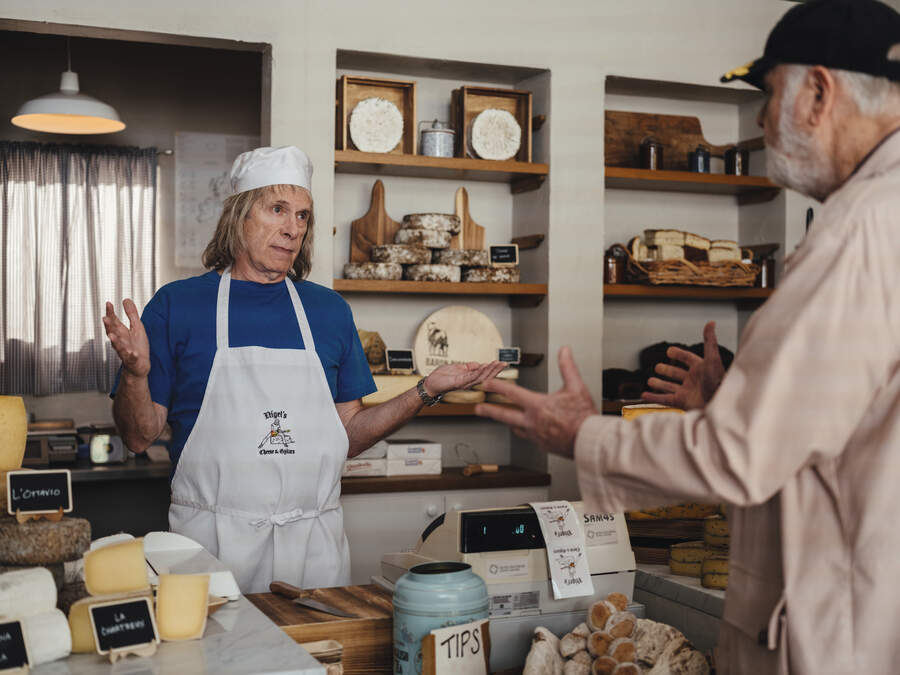
The pair’s unresolved issues are evident when the members of Tap finally meet for the first time in a decade and a half. There’s a tension to the three of them being in the same room together that the presence of DiBergi’s cameras can’t paper over.
“I’ve grown musically, and I’m not saying I’ve left everyone in the dust, but there are times when it seems like Nigel is dragging his feet and he wants to stay where he is,” says St Hubbins. “He wants to be a rebel. That’s fine. That’s what I want too. But I’ve got a bit of discipline to my rebellion. He’s an anarchist; I’m a structuralist.”
St Hubbins seems to put most of the blame at his bandmate’s feet, but one scene in the film suggests he may be a big part of the problem himself. At one point, Paul McCartney drops by the studio to watch Tap rehearse for the show and offer musical advice. While Tufnel and Smalls welcome what McCartney has to say, St Hubbins is significantly less welcoming, to the point of embarrassment.
“Well, listen, I just thought he was a bit: ‘This is the way it should go, this is the way it should be,’” he says, a little defensively. “And I couldn’t agree.” He was in Wings and The Beatles, though. It’s not like he doesn’t know what he’s talking about. “Don’t get me wrong. I think he seems like a personable chap. And he’s got some chops as a songwriter. Just not as a collaborator.”
More surprising is the presence in the film of unlikely Tap fan Elton John. “He smells like the inside of your grandmother’s purse,” St Hubbins says with a fond sigh. Without giving too much away, what starts gloriously – Elton duetting with the band on Stonehenge – ends in ignominy and potentially life-threatening injury. “I have not personally heard from his lawyers,” says St Hubbins, “but I hear he’s doing okay, bless his heart."
Of course, Spinal Tap II isn’t really about what happens on stage in New Orleans, or even the build-up to it. What it’s really about is the unspoken lifelong love affair between David St Hubbins and Nigel Tufnel. He’s the great love of your life, isn’t he?
“Well, people have said that before, but no,” St Hubbins replies. “I feel like Nigel’s hero. And he has been my hero in a lot of ways. We are co-heroic.”
He pauses for a moment in contemplation.
“That’s a good phrase. I’m coining that.”
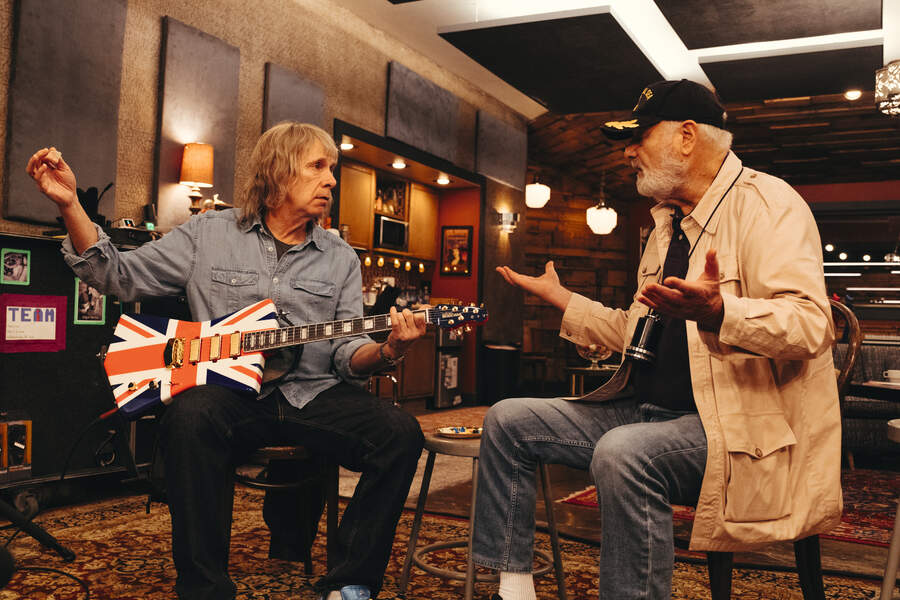
“In a world of quiet, we stood for loud,” Derek Smalls says, proudly yet modestly, of Spinal Tap. The moustachio’d bassist once described himself as the “lukewarm water” between the fire and ice of Nigel Tufnel and David St Hubbins. Today he calls himself “the glue that holds these oversized personalities together”.
The analogy is apt. In the film, Marty DiBergi reveals that Smalls has been working in the Museum Of Glue in London. “The New Museum Of Glue,” the bassist corrects. “Glue is a fascination of mine. Exploring the glues of different nations at different times. Some of it has an animal background to it, some of it’s purely chemical. And I thought, you know, I could bring this to the public’s attention.”
Of the three members of Tap, Smalls has arguably had the highest profile of all in the years since the first film. He released a solo album, Smalls Change, in 2018, and he’s been a judge on Dutch TV talent show Rok Starz.
There have been tough times for him. Smalls got an offer to work at a Russian club, which, unfortunately for him didn’t involve playing music. “I had to do some dancing in clothes that I wouldn’t normally wear. The punters weren’t always sure where to put the money.”
Contacts he made in the Low Countries led him to becoming a spokesman for a new Belgian cryptocurrency, Bruegelcoin. “Named after the painter,” he explains. “They were going to pay me in crypto. It was great for about two months, but then the bottom fell out. So now I’ve got a bunch of Bruegelcoin – in case you’re interested in buying any.”
The Tap reunion couldn’t have come at a better time. Smalls insists that he tried to contact his bandmates over the years. “I picked up the phone,” he says. “The problem is they didn’t.”
Was he nervous about meeting the other two after such a long time when it became clear that the reunion was happening?
“Well I wouldn’t say I was nervous,” he replies. “I’d say I was petrified. I was wondering how they would react to me and how I would react to them. In the end we just decided not to react.”
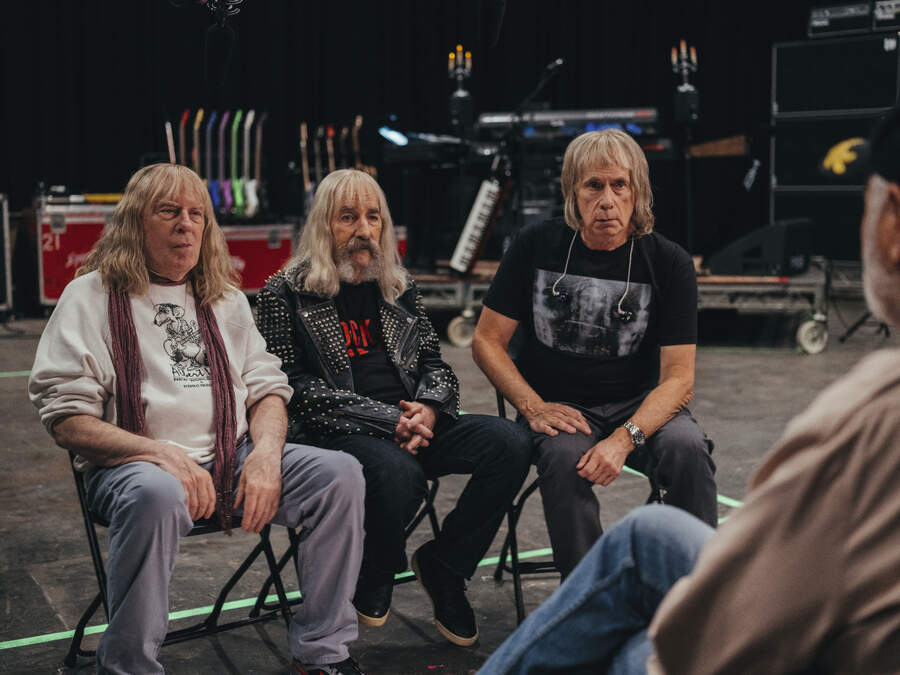
As one half of Tap’s rhythm section, Smalls was key to finding a new drummer for the band – a task made difficult given the demise of several previous incumbents, all of them in scarcely believable ways. Two favoured candidates, Metallica’s Lars Ulrich and Chad Smith of the Red Hot Chilli Peppers, ran scared of the job. In the end they landed on the unknown Didi Crockett - young and female, a first for Tap.
“Well, there were some worries,” he says. “One, you don’t want to be accused of killing a woman. And two, the whole MeToo thing was happening at the time. We thought: ‘Let’s get on the MeToo side of the MeToo movement by getting a woman.’ But she’s a great drummer. And she’s great to look at, which is the main thing.”
And the New Orleans gig itself? Smalls says he enjoyed it, despite the tensions in the build-up and the… well, let’s say eventful climax.
“I thought it was a great crowd,” he says. “Some of them were paid to come, but they were great nonetheless. I saw people mouthing along to the lyrics. They actually knew them. Which is more than David does - he has to have them on a piece of paper to cue them up.”
Smalls is cagey about whether there’s life for Spinal Tap beyond the documentary. “I’m not allowed to say, but I think you haven’t heard the last of the great Derek Smalls,” he concludes. “Are you sure you don’t want to buy some Bruegelcoin?”
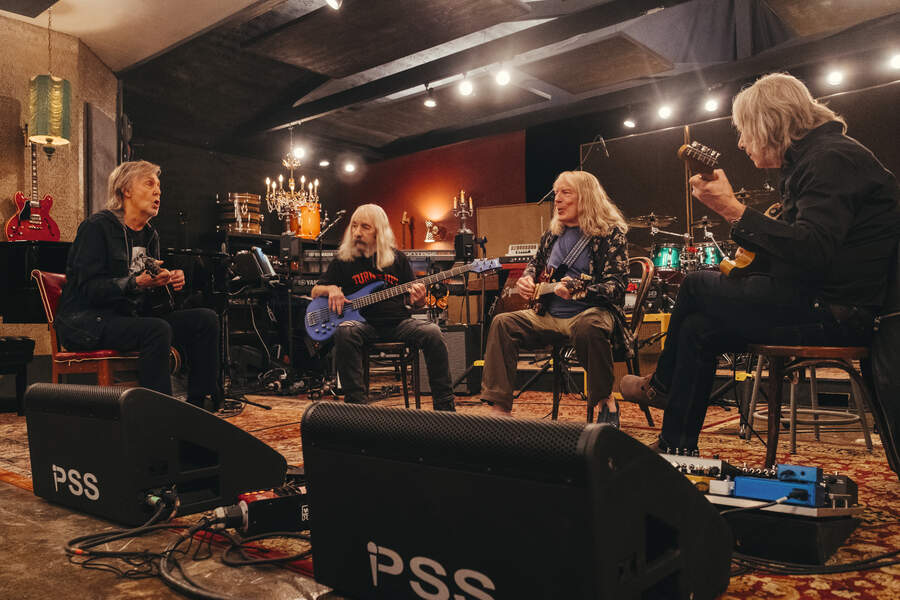
"I’m guessing you live alone. Maybe you have a fake thing going on, but I’m guessing you live alone. Outside of Dulwich.”
Nigel Tufnel is narked. A conversation that began equably enough has descended into irritation on his part. He’s not quite at the stage of ripping off his microphone and storming off camera, partly because he’s too polite and partly because it’s a blank Zoom screen so it wouldn’t have the same effect.
The guitarist, who formed Spinal Tap precursor The Thamesmen with childhood friend St Hubbins in 1964, is vague as to where he’s speaking to Classic Rock from. “Wait a second,” he says in that inimitable semi-detached drawl. “I have a book that tells me where I am. Oh, hang on, that page is missing.”
It may be that he’s in Berwick-upon-Tweed, the English town near the border with Scotland, where he runs a cheese and guitar shop with his girlfriend Moira. “Even as a lad in Squatney [the deprived London suburb where Tufnel and St Hubbins met and grew up] I liked cheese,” he says. “My mum brought me Stilton once. I loved it right away: ‘Yeah, get me some more of this.’ ‘Not likely.’ She wasn’t trying to deprive me, she just didn’t have the money. So I’ve liked it for my whole life. I love guitars and I love cheese, so opening a shop seemed obvious to me.”
It did seem like you vanished after the first film. “If you live in Berwick-upon-Tweed I haven’t vanished,” he says. “I’m there in the shop. I haven’t vanished at all. I just don’t live in the centre of [disdainfully] London.”
What was your initial reaction when Marty DiBergi approached you about the new film?
“Well, the first one was rubbish. It did make us more known than we were, but there are things he showed that weren’t accurate. Like being lost all the time. We weren’t lost all the time. We were lost some of the time.”
Did you have any demands for this one?
“Frankly, we’re in not a position to have a say in anything. We could say whatever we like. We could say: ‘Let’s get paid a lot of money,’ and they would just laugh.”
So you didn’t get paid a lot of money?
“We got paid some money. It was not great money in the world of money. It was alright money. Alright money is better than no money.”
Were you worried about reuniting with David and Derek after so long?
“The answer is yes. We hadn’t spoken for fifteen years. No phone calls, no electronic mail, no what the kids call ‘texts’. I do have a mobile phone, but it’s not the most up-to-date. I can get messages on it but not videos, for instance. A lot of people say: ‘You should see this TikTok thing with people dancing. And I say: ‘I can’t see it.’ I mean, I could see it if it was in front of me. My eyes are fine. I just can’t see it on my phone.”
Right. Back to the film. It did seem quite tense when you first got together.
“There was tension. It was mostly tension. Broken up by laughter, I suppose. And some playing and singing. But then there would be more tension.”
Why did the band play the reunion gig in New Orleans, when you could have played anywhere in the world?
“Could we? I wasn’t aware of that.”
Yes, of course. You’re Spinal Tap, you could have your pick of the world’s great venues.
“Well, it was out of our hands. I was told: ‘This is where we’re going to do the show.’ I said: ‘Okay, just send an aeroplane ticket.’ Which they did.”
Are you surprised that Elton John, who is in the new film, is a Spinal Tap fan?
“He must have gotten a call from Marty. He could have said: ‘Absolutely not. Why would I fucking want to do that?’ But he said yes.”
Maybe he needed the money.
“Well, then you’re stupid if you think that. You have not been following the world of music and money. Even I know that he’s bloody wealthy, and I’m not the most in-touch person.”
What do you think of the finished film?
“I haven’t seen it.”
You must know what’s in it, though.
“[Sighing] I remember doing it. I know that I’m in the film. But I was not editing the film.”
After making it did you and David part on good terms, or did you still hate each other?
“Look, we don’t hate each other. It’s very complicated when you have a long-term relationship with someone you’ve known since you were a kid. It’s not hatred. There is hatred, but it’s mixed in with respect and love and a bit more hatred.”
Last question…
“Oh, good.”
What’s Spinal Tap’s legacy? Do you have one?
“[Testily] You shouldn’t ask people that question. You can’t make up your own legacy, because you’d be fooling yourself. People in the future decide that for you. I have some friends in Berwick-upon-Tweed. They like me. My girlfriend says: ‘I love you’. That’s more important to me than saying: ‘Oh, will Tap be remembered as the people who couldn’t find the stage.’ I don’t care.”
I’m sorry, I didn’t mean to offend you.
“I’m beyond being offended now,” he replies, but then proceeds to disprove his point by launching into a bizarre rant about Classic Rock’s domestic status and the South London suburb of Dulwich.
It’s an inglorious end to our conversation, but maybe it’s the only way for a Spinal Tap interview to conclude. This is a band whose long and sometimes inglorious career has been defined by acrimony, ignominy and idiocy. There are many bands out there, but there is only one Spinal Tap, and for that we should be grateful.
Spinal Tap II: The End Continues is released on DVD and Blu-ray on November 11.
Dave Everley has been writing about and occasionally humming along to music since the early 90s. During that time, he has been Deputy Editor on Kerrang! and Classic Rock, Associate Editor on Q magazine and staff writer/tea boy on Raw, not necessarily in that order. He has written for Metal Hammer, Louder, Prog, the Observer, Select, Mojo, the Evening Standard and the totally legendary Ultrakill. He is still waiting for Billy Gibbons to send him a bottle of hot sauce he was promised several years ago.
You must confirm your public display name before commenting
Please logout and then login again, you will then be prompted to enter your display name.



